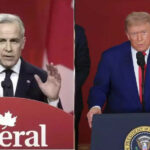Many of the movers and shakers in sport gathered this week inside Twickenham — sorry, the Allianz Stadium — for the annual Leaders Week conference to wag chins about the state of the market.
But while executives gathered in London’s rugby capital, TV cameras were heading to Wembley, where England’s new football manager — master tactician Thomas Tuchel — was giving his first press conference. Choosing the 51-year-old German to lead England’s next World Cup campaign has revived the debate about whether the national coach should be an Englishman, one that has been going on for more than 20 years since Swede Sven-Goran Eriksson first broke the taboo. No team managed by a foreigner has ever won the men’s World Cup — can the volatile Bavarian “rulebreaker” change that? Read this week’s Person in the News to find out more.
This week we’re bringing some top tips from one of the smartest brains in sport and entertainment, plus we speak to the NFL about its global ambitions. Do read on — Josh Noble, sports editor
Send us tips and feedback at scoreboard@ft.com. Not already receiving the email newsletter? Sign up here. For everyone else, let’s go.
What sport can learn from scripted wrestling

One of the headline acts at Leaders Week in London was Mark Shapiro, president of both Endeavor and TKO, the parent company of Ultimate Fighting Championship and WWE.
TKO’s New York-listed shares are up around 60 per cent this year, giving the company a market capitalisation of around $22bn — a valuation that most sports businesses can only dream of. So what, if anything, can other sports learn from a business that combines combat sport with scripted entertainment?
“When you think back to Hulk Hogan, Macho Man Randy Savage, Andre the Giant and the Undertaker. These were stars, but they were personalities — written or not — they were personalities”, said Shapiro. “I think sports has really learned they need to do the same thing, that even if you’re a reluctant star, you have to be out there . . . you got to take some chances.”
As several sports grapple with the recent or pending retirement of their biggest names — from Rafael Nadal to Cristiano Ronaldo and Tyson Fury — the battle for attention is getting tougher. But all it takes is one personality to break through and the rest of the sport can ride the wave.
“When you look at women’s sports, that might be the best example we’ve seen in decades. Look what Caitlin Clark has done for the WNBA”, he said.
Shapiro said that when he ran ESPN he went to “war” to get players to put microphones on and let down their guard — many worried they would say the wrong thing and wind up in trouble. Now, however, the dynamic has changed dramatically.
“Everybody wants to be mic’d. Everybody wants to have their own show. Everybody wants to have their own series. And every athlete, at the very least, wants to have their own social universe that they can monetise because they realise it helps their own brand, but it also helps their own balance sheet,” he said.
WWE’s unique brand of drama, personality and athleticism has already attracted one key fan: Netflix chief content officer Bela Bajaria. She reached a $5bn deal to carry live WWE events on the streaming platform for the next decade, its biggest step yet into live programming.
As rights holders sweat about the outlook for TV, Shapiro’s recent successes suggests he’s someone worth listening to.
Q&A: why the NFL wants to go global

The National Football League is a financial juggernaut. Its media rights deals are worth more than $10bn a year, thanks in large part to its huge drawing power in North America. But the sport has a strategy focused on international growth. NFL franchises play high-stakes regular season matches in front of capacity crowds at the home ground of English Premier League side Tottenham Hotspur.
Scoreboard caught up with NFL executive Peter O’Reilly to talk about the sport’s global play. This transcript has been lightly edited for readability.
The NFL is a massive success in the US, but why is it so important to expand internationally?
Fundamentally, we’ve got fans all around the world who love the game, who have been exposed to it through media, who are hungry for more of it. So finding the right ways to provide more access to our sport and allow more people to connect and fall in love with it . . . we’re proud of the fan base and the business in the US, but there’s a fan base around the world, many of whom love our game.
What has the NFL learned from other sports?
We were in Paris this summer. You go to that beach volleyball venue near the Eiffel Tower and that inspires you to think, “What could a flag football venue look like in LA? How do you create that energy?”
If you look at it through like a Formula One model, you would have a place where you’ve kind of got each week almost, “Where is that international game?” You’re creating mini Super Bowls, if you will, each week across the calendar.
What about media rights?
Our focus continues to be playing the long game, really making sure we are driving reach and the opportunity to engage fully and find partners who are really innovating and leaning in with us . . . The landscape of potential partners has widened. As you saw, we did a global Netflix deal for our Christmas Day games, the first time we’ve done really a true global deal across those games. You see what we’ve done with Amazon and Prime Video with our Thursday night package.
What role do NFL teams play in this global growth?
People love the NFL, but deep cut passion comes when you have a favourite team. The [Minnesota] Vikings are here activating year round, putting on flag football events, engaging not just in London but across the country and that complements the work we’re doing here on a year round basis. Fans are feeling the level of commitment we’re making, we’re committed to games here in the UK through 2029.
What’s the next big step for NFL growth outside the US?
We’ve just got approval from the ownership to increase the number of regular season games we’re bringing around the world up to eight. That doesn’t include the Jaguars game, which would bring that to nine. If we were to go to a new format for the season that went to 18 regular season games and two pre-season games, there’s a world where we could be playing 16 international games each year. The regular season games are not an end in themselves, they’re a catalyst.
Highlights

-
Sixes Social Cricket, a bar that tests your ability to bat against a virtual bowler, is part of a growing trend of “competitive socialising”, where activities like darts, mini-golf, and cricket are paired with food and drinks. The number of venues in the UK has jumped by 40 per cent since 2018. The Savills estate agency expects this to climb further by the end of the decade, as consumers look for new social experiences instead of traditional nightlife.
-
Initial bids for stakes in the eight cricket teams that comprise The Hundred, a short-format competition, were due on Friday. Investor appetite is a major test for the England and Wales Cricket Board, the domestic governing body that is seeking to raise up to £500mn from the auction.
-
Fans will be permitted to drink alcohol at two clubs in the second-tier Women’s Championship, in a trial that could lead to a wider rollout. Booze has been banned in view of the pitch in the men’s game since 1985.
-
NFL owners approved Tom Brady’s deal to buy a minority stake in the Las Vegas Raiders, despite concerns that his buy-in valuation was too low.
-
Fifa signed up Chinese computer maker Lenovo as its global technology partner, in a deal spanning the men’s World Cup in 2026 and the women’s edition the following year. Gianni Infantino, president of world football’s governing body, said artificial intelligence can make a positive difference in football.
Transfer Market

Gerard Piqué’s Kings League hired the former head of the National Basketball Association’s Europe and Middle East business as its new chief executive. Djamel Agaoua will lead the seven-a-side football competition, which has attracted sponsors including Spotify and Adidas and promotes itself with social media influencers.
Final Whistle
Erfurt supporters PAINTING their initials in the away section of their neighbors Carl Zeiss Jena’s stadium, taking rivalry to a whole new level. 🎨
German fourth tier Scheißhaus 🤣pic.twitter.com/3YuLWL2ikm
— Men in Blazers (@MenInBlazers) October 15, 2024
Football fans love to leave their mark when visiting their rivals. But how’s this for commitment? Travelling fans from fourth tier German side Erfurt brought tins of paint and rollers to their game at Carl Zeiss Jena’s home ground so they could paint their team’s initial in gigantic letters on the back of the stand.
Scoreboard is written by Josh Noble, Samuel Agini and Arash Massoudi in London, Sara Germano, James Fontanella-Khan, and Anna Nicolaou in New York, with contributions from the team that produce the Due Diligence newsletter, the FT’s global network of correspondents and data visualisation team





